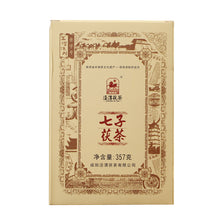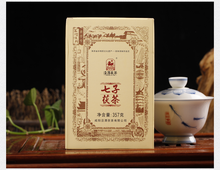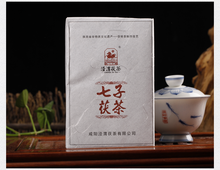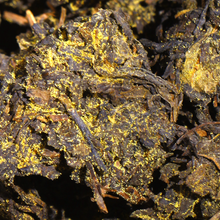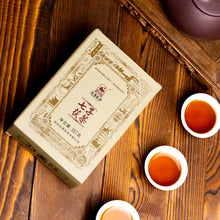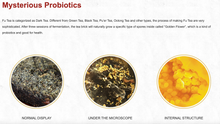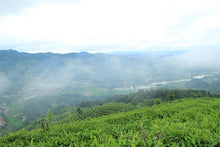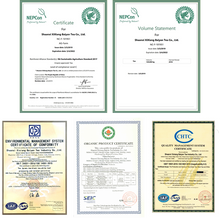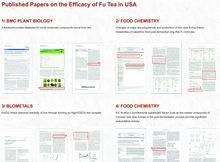
This premium tea is selected from high-quality leaves grown in the tea plantations of the Qin Ling mountains, an area recognized for its nationally preserved natural environments.
The tea threads are tightly rolled, demonstrating neatness and an overall excellent appearance, indicative of the meticulous care in its processing.
A notable feature of this tea is the abundant presence of "Jin Hua" (Golden Flower or Eurotium Cristatum), a natural occurrence that enriches the tea's quality and value.
The tea liquor is clear with a bright hue, a testament to its purity and the careful methods used in its preparation.
To ensure the preservation of its unique characteristics and to enhance its aging process, this tea is stored naturally in Guangzhou, a practice that helps to maintain and develop its distinct flavors and aromas over time.
Drinking Instruction
called tea washing. Spread the tea leaves evenly and fully so that the tea will come out easily. At last, use hot water above 90 degrees to make it and 20 seconds later pour the tea into the clear cup. Adjust the weak and strong of the tea according to the color to cater to different tastes.
Mysterious Probiotics
Fu Tea is categorized as Dark Tea. Different from Green Tea, Black Tea, Pu’er Tea, Oolong Tea and other types, the process of making Fu Tea are very sophisticated. After three sessions of fermentation, the tea brick will naturally grow a specific type of spores inside called “Golden Flower”, which is a kind of probiotics and good for health.
Golden Flower
The golden flower distinguishes Dark Tea from other types and its quality, such as color, density and plumpness, is the evaluation index of the quality of Fu Tea. The golden flower can effectively adjust the level of blood fat and blood sugar, as well as help disgestion, bowel movement and weight control. It is a good choice to improve the sub-health status.
The Ecological Eden In The Depths Of Qinling Mountains
The Qinling Mountains run from east to west, rising in the heart of China. The mountains provide a natural boundary, as well as a climate dividing line between North and South China. To the south of the range, along the Han River, there is northern margin of the eight tea-producing regions in China since ancient times and the organic raw material base of Jingwei Fu Tea is located here. Because of the high-latitude , high-elevation and no pollution, the natural environment is very suitable for tea trees. In addition, a big temperature difference between day and night, and a longer growing session for tea plants here make the highest-quality tea with many beneficial components.The legend of the East has never been interrupted for thousands of years.Now, the best tea is still being sold from the Qingling Mountains along the ancient Silk Road.
The Organic Raw Material Base
Bai Yan Tea Mountain, a fairyland on earth, located in Qinling Mountains, is the organic raw material base of JingWei Fu Tea. It is full of fresh air and is floating with clouds and fog throughout the year.In winters, the tea mountain is blanketed by snow, so the tea trees not only have a long resting period to absorb abundant trace elements and nutrients from soil, but also have been fully accumulated in the tea leaves.
JingWei Fu Tea company has a strict supervision and control system from planting to drinking. We strictly stick to the national standard for organic plantation and guarantee every tea leaf and every tea brick are safe and super excellence.
Tea Garden Certificate
SHAANXI XIXIANG BAIYAN TEA RA FARM CERTIFICATE
SHAANXI XIXIANG BAIYAN TEA RA FARM VOLUME STATEMENT
ENVIRONMENTAL MANAGEMENT SYSTEM CERTIFICATE OF CONFORMITY
ORGANIC PRODUCT CERTIFICATE
QUALITY MANAGEMENT SYSTEM CERTIFICATE
History&Brand Story
Fu Tea is a type of fermented tea and categorized as Dark Tea. It was invented by Xianyang people of Shaanxi with a special processing technology in 1368. Because the tea was compressed into brick form, and had the similar function with Fu Ling (a traditional Chinese herbal medicine), it got the name Fu Tea, or Fu Bricks. In Chinese, the pronunciation of Fu also means happiness, thus making the tea name an auspicious one with the meaning of bringing happiness and enjoyment.
Original Fermentation Place
The city of Xianyang is the original fermentation place of Fu Tea with its unique geography and climate. There are three indispensable elements for making Fu Tea, the climate conditions at the Central Shaanxi Plain, the water of Jing-Wei River and the techniques held by the local people. Production Manufacture Technique of JingWei Fu Tea have been listed as Intangible Cultural Heritage Project of Shaanxi Province for protection.
The great health benefits of Fu Tea made it an indispensable drink for people in daily life, and therefore the governments in ancient China made standardized management of the production and sales of it. In addition, Fu Tea is regarded as the earliest standardized tea product in China.
Powerful Research Ability and Technical Support
JingWei Fu Tea is a leading brand in Chinese Dark Tea Industry and is awarded a famous trademark in China. The company has also been appointed as Engineering Research Center of Fu Tea by State Forestry Administration, Key Laboratory of the State Tea Science Group; Meanwhile, it is chosen as the secretariat of China Tea Science Society Dark Tea Science Committee and National Technical Committee on Tea of Standardization Administration of China Fu Tea Working Group, which is rarely seen in tea industry in China.










